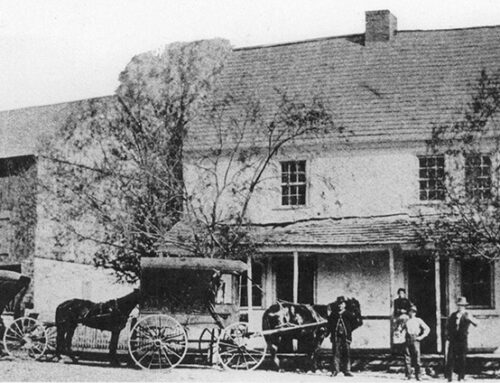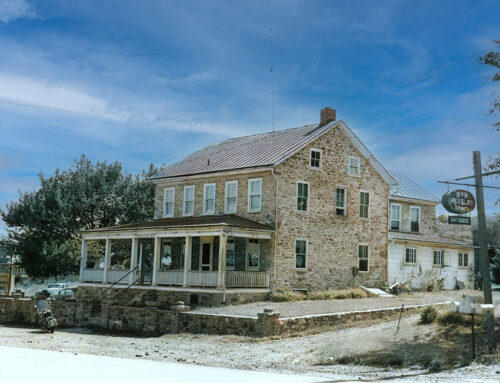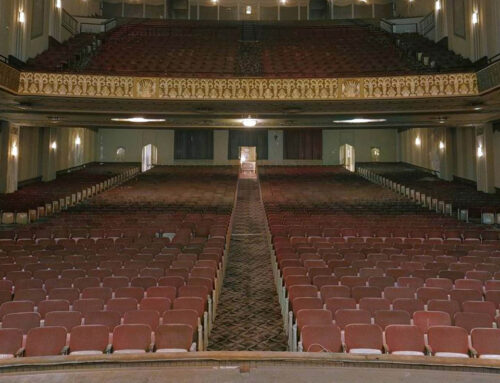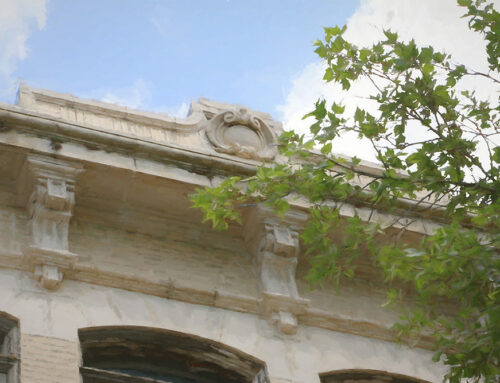Michael Brecht, (1732-1814), the third son of an emigrant, came to Reading in January 1752, the year Berks County was established, and built a simple dwelling on lot No. 391 as stipulated in the land patent of July 16, 1752. The lot, 60 feet in front by 230 deep, was situated on the northwest corner of Callowhill and Thomas Streets (Fifth and Washington).
At this site, Michael applied his trade as a saddler with increasing success. In 1760 he was able to erect a large stone dwelling on the lot with a front of 32 feet and a depth of 34 feet as seen below. Here he carried on his business as a saddler for a number of years.

In 1754 his oldest son Jacob was born. Sometime after the birth of Michael, his second son, in 1759, his wife Margaret died.
In 1767, he married Kitty Huber-Bower, widow of Conrad Bower who was the proprietor of a Penn Street Inn located on the east side of the “Old White Store” of Conrad Weiser, the noted Indian agent.
Michael was elected one of the commissioners of Berks County commissioner, a post he held three years.
Before the close of the Revolutionary war Mr. Brecht had acquired considerable real estate consisting largely of out-lots and small tracts of land near the town. These he farmed up to the time of his death, housing his stock, horses and cattle in the extensive stabling on the rear of his Callowhill (Fifth) Street residence. In 1810 he sold to his son David for the consideration of $500, the vacant part of his lot No. 391, lying immediately north of his house. It contained 28 feet in front on Fifth Street by 230 feet in depth. Upon the lot David erected a three-story brick dwelling for himself and family.
Michael Brecht had four children by his second wife, viz., Sarah, David, Peter and John, the last two dying in the lifetime of their parents. He died at Reading August 1, 1814, his widow surviving him but a few months. They were both buried in the Reformed graveyard on the northeast corner of Sixth and Washington streets, and their remains were afterwards removed to the Bright lot in the Charles Evans Cemetery.
In 1817, son David converted the Brecht home into the “Farmers’ Hotel.” Eight years later, he built a 3rd story of brick atop the original stone structure, and in 1888 Francis Bright added a 4th story and within a decade, yet another story was constructed.
Francis Bright (Brecht), who was born in 1812 and died in 1894, took the Farmers’ Hotel at its appraisement under the will of his father, David Bright. Charles S. Bright, son of Francis Bright, sold the property, 32 x 230 feet, to Thomas A. Wilson, July 20, 1896, for $27,000. It was Thomas A. Wilson who constructed a 3-story stable along Washington Street which quartered the horses of farmers when they attended the markets.
Mr. Wilson sold the property, April 1, 1905, to Hamilton Godfrey, for $50,000. The hotel at that time had 42 guest rooms. The hotel also was a stopping place for the Bernville and Allegheny stages.
On April 1, 1920, the first floor of the hotel, together with the wagon sheds that stood at the rear of the 5th Street side, were converted to store rooms and the upper floors to apartments.
Below: Farmers’ Hotel, northwest corner of Fifth and Washington Streets.

The Farmers’ Hotel was one of Reading’s best known and most, prominent places of entertainment. Below is the interior of the basement Rathskeller, which thrived during the years Hamilton Godfrey was proprietor of the hotel. The Rathskeller featured high-backed chairs and cozy tables. To patronize the Rathskeller, one descended outside steps right off the corner which led down the Washington Street side. Between 1910 and 1917, Godfrey ran ads in the Reading Eagle once or twice a week calling attention to his vast stock of cut-rate cigars, wine, and liquor.
Below: Farmers’ Hotel Rathskeller.

The 18-story Art Deco-style Abraham Lincoln Hotel replaced the Farmers’ Hotel. It was built in 1929-1930 and was opened on May 22, 1930.
The hotel was one of the last designed by New York City architect William Lee Stoddart.
Constructed at the height of the 1920s hotel building boom, the Abraham Lincoln Hotel reflected the previous 30 years of developments in the hotel industry in the United States. It offered the latest amenities in hotel services and reflected cutting edge hotel design with bathrooms, radio, telephone, and ceiling fans in every room.
Famous guests of the hotel included composer and conductor John Philip Sousa, who died in his 14th-floor room in 1932; Eleanor Roosevelt; and Gene Autry.
Below: Abraham Lincoln Hotel.

The historic Abraham Lincoln Hotel and its attached 310-space parking garage were purchased by Shuman Development Group for $5 million in 2013. The hotel ceased operations on November 1, 2016 and was converted to an upscale apartment building. It is now under the name Lincoln Tower Apartments.






Leave A Comment